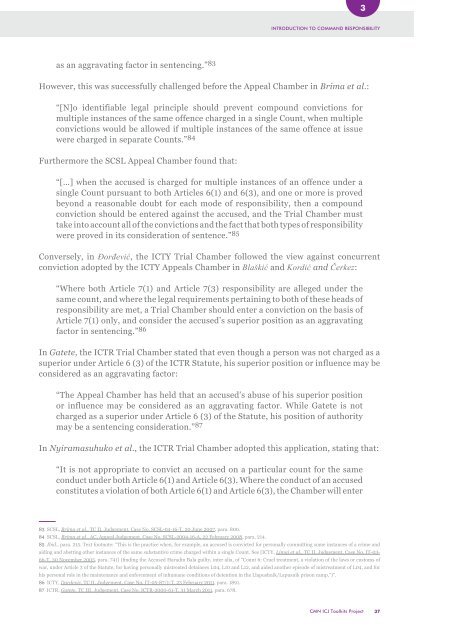Command Responsibility
CMN_ICL_Guidelines_Command_Responsibility_En
CMN_ICL_Guidelines_Command_Responsibility_En
You also want an ePaper? Increase the reach of your titles
YUMPU automatically turns print PDFs into web optimized ePapers that Google loves.
3<br />
INTRODUCTION TO COMMAND RESPONSIBILITY<br />
as an aggravating factor in sentencing.” 83<br />
However, this was successfully challenged before the Appeal Chamber in Brima et al.:<br />
“[N]o identifiable legal principle should prevent compound convictions for<br />
multiple instances of the same offence charged in a single Count, when multiple<br />
convictions would be allowed if multiple instances of the same offence at issue<br />
were charged in separate Counts.” 84<br />
Furthermore the SCSL Appeal Chamber found that:<br />
“[…] when the accused is charged for multiple instances of an offence under a<br />
single Count pursuant to both Articles 6(1) and 6(3), and one or more is proved<br />
beyond a reasonable doubt for each mode of responsibility, then a compound<br />
conviction should be entered against the accused, and the Trial Chamber must<br />
take into account all of the convictions and the fact that both types of responsibility<br />
were proved in its consideration of sentence.” 85<br />
Conversely, in Đorđević, the ICTY Trial Chamber followed the view against concurrent<br />
conviction adopted by the ICTY Appeals Chamber in Blaškić and Kordić and Čerkez:<br />
“Where both Article 7(1) and Article 7(3) responsibility are alleged under the<br />
same count, and where the legal requirements pertaining to both of these heads of<br />
responsibility are met, a Trial Chamber should enter a conviction on the basis of<br />
Article 7(1) only, and consider the accused’s superior position as an aggravating<br />
factor in sentencing.” 86<br />
In Gatete, the ICTR Trial Chamber stated that even though a person was not charged as a<br />
superior under Article 6 (3) of the ICTR Statute, his superior position or influence may be<br />
considered as an aggravating factor:<br />
“The Appeal Chamber has held that an accused’s abuse of his superior position<br />
or influence may be considered as an aggravating factor. While Gatete is not<br />
charged as a superior under Article 6 (3) of the Statute, his position of authority<br />
may be a sentencing consideration.” 87<br />
In Nyiramasuhuko et al., the ICTR Trial Chamber adopted this application, stating that:<br />
“It is not appropriate to convict an accused on a particular count for the same<br />
conduct under both Article 6(1) and Article 6(3). Where the conduct of an accused<br />
constitutes a violation of both Article 6(1) and Article 6(3), the Chamber will enter<br />
83 SCSL, Brima et al., TC II, Judgement, Case No. SCSL-04-16-T, 20 June 2007, para. 800.<br />
84 SCSL, Brima et al., AC, Appeal Judgement, Case No. SCSL-2004-16-A, 22 February 2008, para. 214.<br />
85 Ibid., para. 215. Text footnote: “This is the practice when, for example, an accused is convicted for personally committing some instances of a crime and<br />
aiding and abetting other instances of the same substantive crime charged within a single Count. See [ICTY, Limaj et al., TC II, Judgement, Case No. IT-03-<br />
66-T, 30 November 2005, para. 741] (finding the Accused Haradin Bala guilty, inter alia, of “Count 6: Cruel treatment, a violation of the laws or customs of<br />
war, under Article 3 of the Statute, for having personally mistreated detainees L04, L10 and L12, and aided another episode of mistreatment of L04, and for<br />
his personal role in the maintenance and enforcement of inhumane conditions of detention in the Llapushnik/Lapusnik prison camp.”)”.<br />
86 ICTY, Dordevic, TC II, Judgement, Case No. IT-05-87/1-T, 23 February 2011, para. 1891.<br />
87 ICTR, Gatete, TC III, Judgement, Case No. ICTR-2000-61-T, 31 March 2011, para. 678.<br />
CMN ICJ Toolkits Project<br />
37


